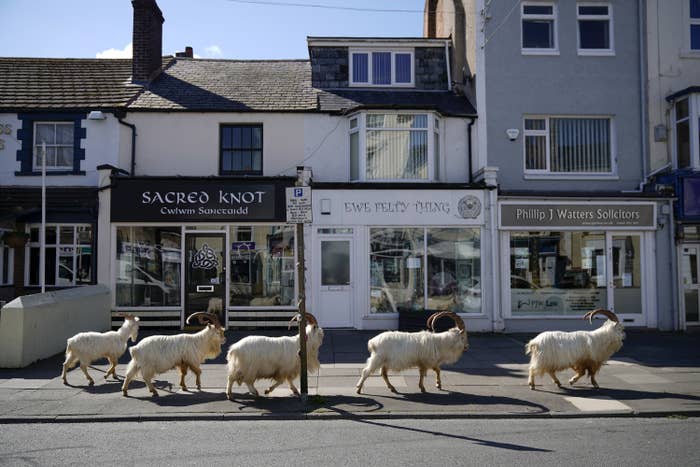Well climate change is still a thing as everybody knows, but what is actually helping slow down climate change thanks to COVID-19 is (ironically enough) people staying put. CO2 emissions have been down drastically in areas under lockdown and of course everyone has seen this fun photo or something like it from Llandudno in North Wales. The goats (a non-native species) typically live on the Great Orme, a limestone headland (and climbing area) near town. Sadly the dolphins swimming in the Grand Canal in Venice turned out to be fake.

The natural world, it seems, is exploring us in some interesting ways. Which is cool. Except when its a potentially lethal virus. Which humans are in a way too, so there's that. But anyway, what is more interesting is a consideration of whether climbing in "exotic" locales is, or has been, contributing in some small way to the release of dangerous organisms into wider human populations. The bats that carried COVID-19 lived deep in limestone caves in China. As it happens, climbers like limestone caves too. It doesn't take a genius to consider how easily something might transfer to a broader population from a climber hiking into an area and "cleaning" (i.e. disrupting an active biome and releasing heaven knows what into the air) a route in such a place, climbing it, then flying out with their gear (covered in heaven knows what) back to "civilization" to make a video about it and encouraging others to visit too. Those others bring yet more people encouraging further disruption and encroachment on wild habitats. These zoonotic transmissions are more and more likely as globalism continues to extend its economic and cultural influence.
I just read in 8a.nu about the establishment of climbing in Suriname, a country on the Atlantic coast in South America. It has extensive natural rainforest areas and apparently some potential for climbing. Yet is climbing good for the wildlife there? And maybe as importantly is climbing there good for us? A New York Times Travel section article blandly describes the market in the capital city of Parimaribo as follows: "Maroons and Arawaks, one of the country’s indigenous tribes, sell nearly everything under the sun from the country’s interior at the Freedom Market — from bush meat to live monkeys and bottles of casiri, a brew made from cassava." Street markets selling "bush meat" sounded so, well, exotic, in 2011. Today, we know that its equivalent in the "wet markets" of Wuhan and elsewhere launched the global pandemic that everything and everyone afterwards will remember 2020 for.
In other words is there a point at which we really would be better off not exploring? When do we finally say enough is enough? Disturbing sensitive ecological areas for fun and profit needs to be looked at quite a bit more carefully going forward, especially in profoundly biologically diverse regions where the human/biological interface is especially porous and potentially hazardous. Climbers like to consider themselves somehow exempt from the laws of nature as they "adventure" around the world in climates and environments that would be better left untouched. When you consider the possibility that one pried-off flake or the disturbed bat nesting area behind it could unleash a pandemic that could kill hundreds of thousands or millions of people and bring the global economy to its knees, maybe, just maybe, it's not worth it?
Note: for a compelling account of the ideological origins of this pandemic, please read "COVID-19 and Circuits of Capital" in which I saw the phrase "the frontiers of capital production," a phrase which perfectly echoes both the terrain and theoretical premise of the outdoor industry and which helped inspire this post.




